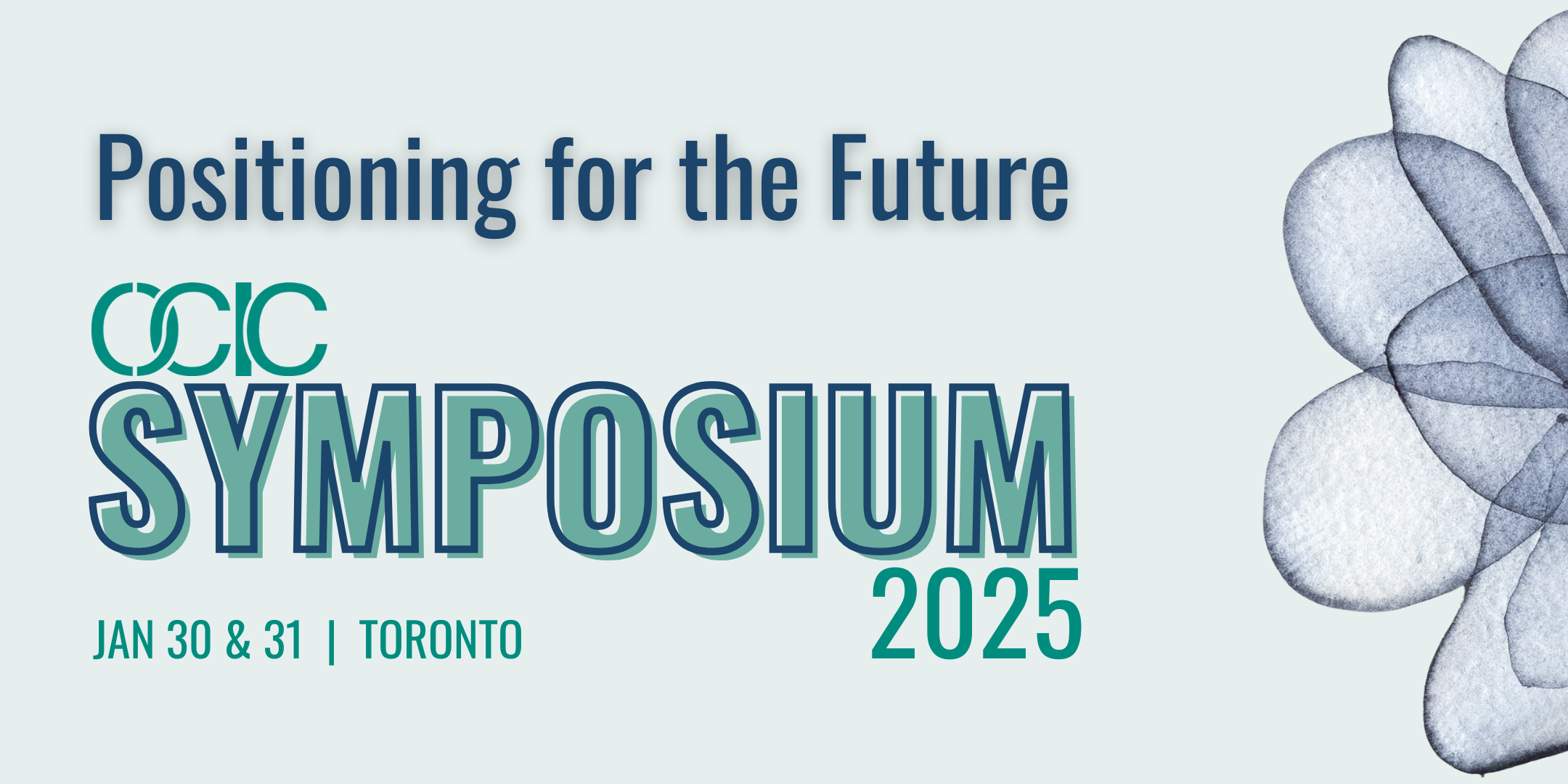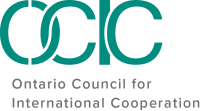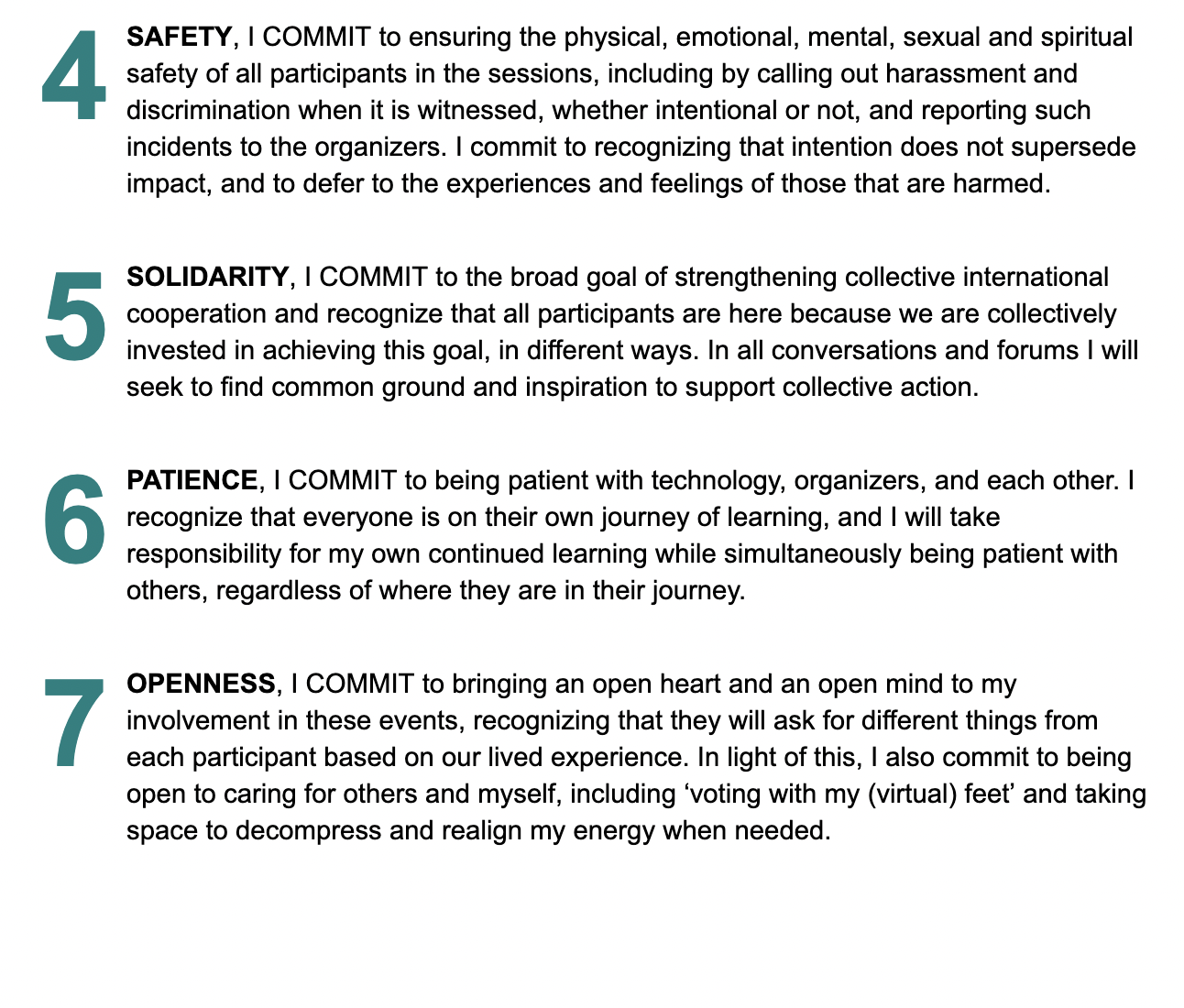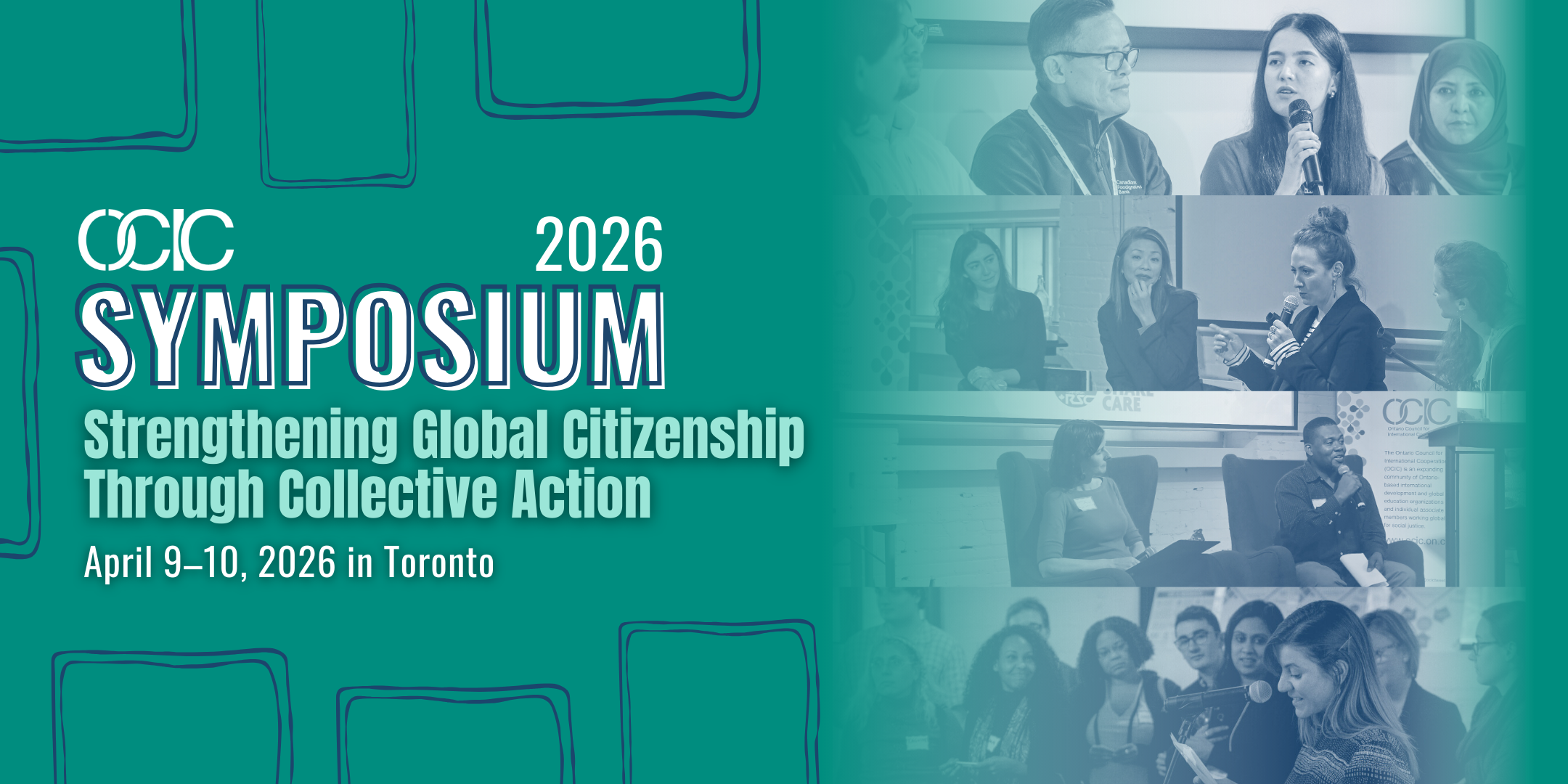
Positioning for the future: OCIC Symposium 2025
January 30 – 31, 2025
OCIC’s Symposium 2025: ‘Positioning for the Future’, was organized in partnership with Humber Polytechnic on the traditional and treaty lands of the Mississaugas of the Credit. Known as Adoobiigok, the “Place of the Alders” in Michi Saagiig language, the region is uniquely situated along Humber River watershed, which historically provided an integral connection for Anishinaabe, Haudenosaunee, and Wendat peoples between the Ontario Lakeshore and the Lake Simcoe/Georgian Bay regions. Now home to people of numerous nations, Adoobiigok continues to provide a vital source of interconnection for all.
We kicked off International Development Week (IDW) 2025 with this two-day gathering for OCIC members, associates, partners and youth with interest in positioning for and co-creating our collective future.
This Symposium presented an important and strategic opportunity to:
- Take time for reflection and learning, taking into consideration key principles, values, trends, priorities and drivers of change shaping the international cooperation and global education sectors in Ontario and globally;
- Draw insights from Strategic Foresight work undertaken through the Cooperation Canada and International Development Research Fund (IDRC) ‘Futures Initiative’, Red Argentina para la Cooperación Internacional (RACI) and other relevant initiatives such as the Inter-Council Network (ICN) research focused on More Decolonial, Feminist, Anti-Racist Public Engagement;
- Reflect upon, reconsider and help to refine OCIC’s current Theory of Change and Strategic Objectives to better align with the changing context and emerging needs; and
- Celebrate our community and collective accomplishments
Date and Time
January 30, 2025 from 10:00 am – 7:00 pm ET
January 31, 2025 from 10:00 am – 4:00 pm ET
Location
Humber College – Lakeshore Campus
17 Colonel Samuel Smith Park Dr, Etobicoke, ON M8V 4B6
This initiative is undertaken with financial support from the Government of Canada through Global Affairs Canada, in partnership with Humber Polytechnic and with support from thought leaders from Aid Watch Canada, Cooperation Canada, the Inter-Council Network of Provincial and Regional Councils for International Cooperation (ICN), and Red Argentina para la Cooperación Internacional (RACI).


FULL PROGRAM, AGENDA & BIOS
Program
Thursday, January 30, 2025 | |
| 9:00 – 9:30 | Participant Arrival, Registration & Fair Trade Café Meet OCIC staff and Symposium volunteers at the doors of Humber Polytechnic’s Longo Center for Entrepreneurship / G Building to get registered, enjoy light refreshments, and network with contributors and participants before our program begins. |
| 9:30 – 10:30 | Welcome & Land Acknowledgement Get to know each other and Symposium hosts and partners Kimberly Gibbons, Susan MacGregor, Jackie Wright and James Parsons as they set the stage for the day ahead. |
| 10:30 – 12:30 | Future Scenarios for International Cooperation: Learn how strategic foresight tools and processes can help reimagine global development cooperation in an era of uncertainty and transformation with Shannon Kindornay, in conversation with Guillermo Correa and Andy Ouédraogo. Better understand how civil society actors across diverse contexts can apply these methodologies to anticipate emerging challenges, foster innovation, and shape a more equitable, sustainable, and inclusive global agenda. |
| 12:30 – 1:45 | Networking Lunch |
| 1:45 – 2:15 | Building from OCIC’s Theory of Change & Impact Learn about OCIC’s current Theory of Change, strategic priorities and impact, and about our strategic planning intentions in 2025 from Kimberly Gibbons and Molly Grove. |
| 2:15 – 4:15 | Thematic Think Sessions Part 1 Share your reflections on the future of the international cooperation and global education sectors in Ontario, Canada, and globally, and the ways your organization and OCIC may build from our strengths and better align with changing context and emerging needs, and facilitative support from Kimberly Bowman. Contribute to two of the following thematic discussion tables:
|
| 4:15 – 5:00 | Plenary Consider the perspectives of others at the ‘Thematic Think’ Gallery, and hear key takeaways from table facilitators. |
| 5:00 – 7:00 | International Development Week 2025 Networking Social Connect with and celebrate the wonderful and diverse international cooperation community in Ontario and beyond. Throughout the evening hear reflections from Sarah Judd, James Parsons, Muzhda Akbari and Bella Lam, and enjoy live music with guest artists Gabriel Henriquez and Julio Henriquez as you mix and mingle with OCIC members, partners and friends. |
.
Friday, January 31, 2025 | |
| 9:00 – 9:30 | Participant Arrival, Registration & Fair Trade Café Meet us for a light breakfast and time to network at Humber College – Robert A. Gordon Learning Centre / K Building. |
| 9:30 – 10:00 | Welcome Start the day with a warm welcome and introduction to the sessions ahead from hosts Shehara Athukorala and Helena Shilomboleni. |
| 10:00 – 12:00 | Parallel Dialogues
Join Kagwiria Muturia, James Parsons and Brian Tomlinson in a session focused on research, evidence and discussions that have been undertaken by the Financing Transparency Workstream Civil Society Policy Group (CPAG), with both Canadian civil society and GAC members. This work has focused on current policy and practices relating to GAC funding modalities for civil society. Brian Tomlinson will present relevant evidence on trends in CSO financing, as well as some key areas and rationale for reforming current practices, and a number of draft recommendations, which are now open for discussion with the diversity of Canadian civil society, including small and medium organizations (SMOs). Participants will then have the opportunity to discuss and provide feedback on the recommendations and questions in small groups, and bring key suggestions and ideas back to workshop participants and CPAG members. *Most relevant to leaders and senior managers of CSOs that work or seek to work with Global Affairs Canada (GAC) funding, and would like to contribute ideas for increased transparency and support.
Join Sarah Judd, Pragya Tikku and Judyannet Muchiri to learn about the ICN’s body of work exploring decolonial, anti-racist, and feminist approaches to public engagement (PE). In this session, Judyannet Muchiri will share strategies PE practitioners use to incorporate these frameworks, the challenges they face and how they navigate them, and the conditions that support the meaningful application of these approaches. Using key lessons learned from ICN research, participants will discuss practical ways in which organizations can enhance PE through these three lenses, ensuring efforts are responsive to evolving social and political contexts while fostering solidarity. Additionally, you will explore how these approaches can be integrated into organizational practices to create more inclusive, equitable, and effective engagement processes, ultimately leading to impactful and transformative outcomes. *Ideal for PE practitioners, program and project managers, communicators, planners, facilitators and those interested in and/or responsible for community engagement and mobilization.
Join Shehara Athukorala, Efemena Ozugha and Guillermo Correa in an engaging session exploring the evolving dynamics and unpacking key concepts of civic space and enabling environments for CSOs, with insights into RACI’s perspective on their new strategic plan. Participants will learn about global trends affecting civic space, as well as internal and external challenges CSOs may face in advancing their missions. Through interactive discussions and a hands-on exercise, participants will reflect on how these challenges and opportunities resonate with the Canadian context, identifying common trends and actionable solutions. The session will also share lessons learned from RACI’s action plan to navigate these challenges effectively. *Ideal for CSOs engaged in locally led development, advocates for civic engagement, and individuals interested in and/or passionate about fostering inclusive civic spaces |
| 12:00 – 1:00 | Networking Lunch |
| 1:00 – 3:00 | Thematic Think Sessions Part 2 Deepen your reflections on critical issues shaping the international cooperation and global education sectors. |
| 3:00 – 3:30 | Closing Wrap up the Symposium in community, with closing remarks from Aysha Dawood, Kimberly Gibbons, and Lisa Swainston. |
Contributor Bios
 Muzhda Akbari, Founder of CodeGreen Afg and OCIC YPH Member
Muzhda Akbari, Founder of CodeGreen Afg and OCIC YPH Member
Muzhda (she/her) is a youth advocate for girls’ education and refugee rights, recipient of the Diana Award, and the founder of CodeGreenAfg, an initiative focused on providing educational resources and opportunities to girls in Afghanistan. As a youth activist in Canada, she serves as a youth policymaker with the Ontario Council for International Cooperation and a member of the Aga Khan Foundation’s Youth Advisory Board. Muzhda is driven by her mission to ensure every girl has the right to education and the chance to empower herself, striving for a world of equality and opportunity.
 Kimberly Bowman, Planning, Learning & Evaluation Consultant
Kimberly Bowman, Planning, Learning & Evaluation Consultant
Kimberly (she/her) specialises in strategy and learning for social impact, and brings a background in applied research, evaluation, strategic communications and influencing. She has worked with a range of social enterprises and NGOs in Canada and the UK, led applied research for a policy institute at Toronto Metropolitan University (TMU) and served as Director of Strategy for Girl Guides of Canada. Kimberly holds a B.A.(Hons) in International Development from McGill, a MSc in Social Research Methods from the London School of Economics and is currently a graduate student in the Masters of Environment & Business program at the University of Waterloo. She now makes her home in Burlington, Ontario.
 Guillermo Correa, Executive Director, Red Argentina para la Cooperación Internacional (RACI)
Guillermo Correa, Executive Director, Red Argentina para la Cooperación Internacional (RACI)
Lic. Guillermo Correa holds a degree in Political Science with a specialization in International Relations, graduating with honors from the University of Buenos Aires. With extensive experience in both academia and practice, he has taught at the university level, focusing on international relations and civil society engagement. His expertise includes resource development, fundraising, and moderating focus groups. As the Executive Director of RACI, Guillermo has led initiatives to enhance international cooperation and expand access for civil society organizations. He is also a member of both CIVICUS and IAVE Global Boards. In addition, he is an active public speaker, panelist and contributor to publications on topics related to democracy and international cooperation.
 Aysha Dawood, OCIC Board of Directors & Coordinator, Canada Forum for Impact Investment and Development (CAFIID)
Aysha Dawood, OCIC Board of Directors & Coordinator, Canada Forum for Impact Investment and Development (CAFIID)
Aysha (she/her) is an advocate for both local and global scale social equality, with a focus on affordable housing and sustainable finance. This ambition stems from her intersectional identities, and the transformative experiences gained while working with populations made vulnerable in the UK, Southern Africa, and Canada. She is fuelled by research, attempting to unravel the root systemic drivers of poverty. Aysha works as an operational and strategic consultant with non-profits. Her current work includes coordinating the management of the Canada Forum for Impact Investment and Development (CAFIID), and researching the nexus of human rights and financialization. Aysha’s previous positions have been with Oikocredit, the Centre for Affordable Housing Finance in Africa, South Liverpool Homes and the City of Toronto. Aysha holds a master’s degree in Local Economic Development, a bachelor’s degree in Urban and Regional Planning, and diplomas in Architectural Technology, and GIS (Geographical Information Systems) and Urban Planning. Aysha has been a member of the OCIC Board of Directors since 2019, serving on the Finance and Sustainability, Membership and Nominations, Governance, and Executive Committees. She has also served as Board Secretary for three years, helping to maintain OCIC’s governance files.
 Molly Grove, OCIC Board of Directors & Manager for Global Impact, Salanga
Molly Grove, OCIC Board of Directors & Manager for Global Impact, Salanga
Molly (she/her) has served on OCIC’s Board for the past three years and is currently co-chair of the Strategic Planning Committee. As the Manager for Global Impact at Salanga, a values-driven company specializing in MEAL tools, training, and technology, Molly leverages her expertise to support organizations around the world. She is deeply passionate about fostering partnerships, sharing best practices, and designing innovative tools and processes to bring impactful projects and initiatives to life.
Molly has a rich background from across the development sector, including past work with the Aga Khan Foundation Canada (AKFC), Grand Challenges Canada (GCC), Global Affairs Canada (GAC), and College of the Rockies/VETA in Tanzania. She holds a Master’s degree from the Norman Paterson School of International Affairs at Carleton University, where her focus was on Program Management, Gender and African Studies.
 Shannon Kindornay, Chief Operations Officer, Cooperation Canada
Shannon Kindornay, Chief Operations Officer, Cooperation Canada
Shannon Kindornay (she/her) serves as Chief Operations Officer at Cooperation Canada. Previously she was Director of Research, Policy and Practice, and Interim CEO since joining the organization in 2019. With an enthusiastic commitment to feminist and human rights-based development, Shannon has worked at the research-policy nexus in international development for 15 years. Prior to joining Cooperation Canada, Shannon built a successful independent consultancy business and served as an Adjunct Research Professor at Carleton University’s Norman Paterson School of International Affairs. Shannon also worked for the Canadian International Development Platform, the North-South Institute and the Canadian International Development Agency. In her community, Shannon is part of the global movement of Girl Guiding.
 Bella Lam, CEO, Jane Goodall Institute of Canada and OCIC Board Vice-Chair
Bella Lam, CEO, Jane Goodall Institute of Canada and OCIC Board Vice-Chair
Bella (she/her/elle) has over 20 years of experience in international cooperation and community development, amplifying the work of local partners across regions of Latin America, South Asia, and Sub-Saharan Africa. She is currently the CEO at the Jane Goodall Institute (JGI) of Canada, leading a team to address the convergence of three crises: climate change, biodiversity loss, and environmental inequity. Bella has in-depth experience with community-centered conservation focusing on ecologically sensitive regions across Africa, promoting the “One Health” approach that recognizes the well-being of people, animals and the environment are deeply interconnected. She has helped to build a team at JGI Canada that engages youth across the country, developing young leaders to take actions on sustainability issues, and collaborating with Indigenous-led partners on reconciliation and decolonization. Supporting an anti-racist and anti-oppression framework is one of Bella’s priorities at her own organization, and she hopes to contribute to the broader dialogue in the sector. She is a strong advocate for climate and gender justice, and has been a Board member of OCIC since 2021. Bella fills her cup by connecting with nature, enjoys hiking, camping, canoeing and all things outdoors!
 Allan Lissner, Photographer and Filmmaker, Praxis Pictures
Allan Lissner, Photographer and Filmmaker, Praxis Pictures
Allan (he/him) is a Danish-Filipino-Canadian photographer and filmmaker raised in Ethiopia, Liberia, USA, Nepal, Lithuania, Denmark, Jordan, Bangladesh and Canada. Some of the organizations Allan has done work with include 350.org, Amnesty International, GlobalAware, Idle No More, the Indigenous Environmental Network, Indigenous Climate Action, KAIROS, Oxfam, Make Poverty History, the Norwegian Church Aid, the Ontario Council for International Cooperation (OCIC), the United Nations Development Program, and the United Nations Women’s Association in Bangladesh.
 Susan MacGregor, Program Coordinator, Humber Polytechnic
Susan MacGregor, Program Coordinator, Humber Polytechnic
Susan (she/her) is an International Development/Humanitarian Assistance specialist with over 15 years experience in the International Relief and Development Industry. She spent 12 years based overseas providing direct logistics services to victims of natural disasters and conflict. Upon returning to Canada, Susan worked on a consultative basis with World Vision, the Canadian Red Cross, Pearson Peacekeeping Centre, Air Serv International, and the Department of National Defense helping to analyse and improve internal processes and to create in-house manuals and training materials. Since 2009, Susan has been in charge of the International Development Graduate program at Humber Polytechnic, which trains the next generation of community and international development professionals to respond to needs both internationally and in Canada’s underserved communities.
 Namrata Mahboobani, AVP, Corporate Strategy Office, Definity
Namrata Mahboobani, AVP, Corporate Strategy Office, Definity
Namrata (she/her) is a seasoned strategy professional with close to 20 years of experience in leading strategic initiatives across diverse industries. Currently serving as a leader of strategy management for a top Canadian insurer, she leverages her expertise in strategic planning and governance to drive impactful and sustainable outcomes. Beyond her corporate role, Namrata is a dedicated advocate for gender equality and women’s rights, actively volunteering for and supporting initiatives that empower women and build safer communities within the Halton Region in Ontario. She also serves on the Board of Leadership Niagara, aimed at inspiring community minded leaders to drive positive change and address complex issues facing society. Namrata holds a Bachelor of Engineering from Mumbai University, India.
 Judyannet Muchiri, Policy Officer, Inter-Council Network for Provincial and Regional Councils for International Cooperation
Judyannet Muchiri, Policy Officer, Inter-Council Network for Provincial and Regional Councils for International Cooperation
Judyannet’s (she/her) political and intellectual interests include gender justice, participation, digital rights, feminist foreign policy, and knowledge generation processes. She has worked on these areas as a policy analyst, researcher, writer, and community advocate. Her most recent work has been in Canada’s international cooperation sector and the non-profit sector in Eastern Africa. Currently, Judyannet is leading policy work at the Inter-Council Network (ICN), co-leading the Africa Community Engagement Hub and completing a doctorate at Memorial University.
 Kagwiria Muturia, Head of Justice and Peace Programs, World Renew
Kagwiria Muturia, Head of Justice and Peace Programs, World Renew
Kagwiria (she/her) is currently working as the Interim Head of Justice and Peace Programming at World Renew. In this role, she provides leadership and direction to the organization’s global peace-building programs, advocacy efforts, public engagement, and broader justice initiatives. Kagwiria has over 15 years of experience in advocacy, public engagement, human rights, transitional justice, gender equity, and women’s rights. Her work spans diverse geographical contexts, from grassroots to global levels.
Trained as a human rights lawyer, Kagwiria is deeply passionate about justice and systemic change. When she’s not working, she enjoys chasing after her two (not-so-little) sons and experimenting with multicultural recipes.
 Andy Ouédraogo, Research and Program Officer, Cooperation Canada
Andy Ouédraogo, Research and Program Officer, Cooperation Canada
Andy Ouédraogo
(she/her) is a Research and Program Officer at Cooperation Canada and is currently navigating the exciting realms of strategic foresight and international development. With a foundation in international relations and global political economy, Andy has work experience in multilateral organizations, namely the United Nations Environment Programme and the UN General Assembly. She led the Global Cooperation Futures Initiative funded by the International Development Research Centre and aimed at reimagining next generation global cooperation.
Beyond foresight and Futures work, Andy has a keen interest in gender and feminist leadership, Locally-Led Development and the nexus between youth, economic informality, and insecurity.
 Efemena Ozugha, OCIC Board of Directors and Senior Project Manager, Rooftops Canada
Efemena Ozugha, OCIC Board of Directors and Senior Project Manager, Rooftops Canada
Efemena (she/her) is an international development expert distinguished by her proficiency and qualifications at the crossroads of law, human rights, project and human resource management, and community organizing. With seven years of experience in the non-profit sector, she has successfully led large and mid-scale projects and programs across North America, Africa, and Europe. Her expertise is in protecting and promoting human rights, gender equality, democratic governance, social justice, and equitable human settlements. She has held mid-senior leadership roles, offered policy advisory and training, managed projects and programs, drafted legal documents and frameworks, conducted social audits, and managed strategic partnerships.
Efemena is currently a Senior Project Officer at Rooftops Canada where she manages Women Spaces; a 5-year project co-funded by the Government of Canada, designed to reduce poverty and deliver meaningful change to poor and vulnerable women and girls in sub-Saharan Africa. Additionally, she is a pro bono coach and trainer at the African Coaching Network, where she frequently delivers training and strategic learning opportunities to communities and organizations.
 James Parsons, Executive Director, Canadian Partnership Division, International Assistance Partnerships and Programming, Global Affairs Canada
James Parsons, Executive Director, Canadian Partnership Division, International Assistance Partnerships and Programming, Global Affairs Canada
James Parsons joined the Canadian International Development Agency (CIDA) in 2000 and has spent his career in international assistance focused on bilateral programs in Africa and Asia, as well as in the Peace and Stabilization Operations Programs. He previously served as Head of Cooperation at the Office of the High Commission of Canada in Kigali, Rwanda, and has lived and studied in Thailand and Indonesia, focusing on Indigenous Peoples’ issues. James holds a master’s degree in environmental studies from York University, and a Bachelor’s Degree in Environmental Resource Studies with a Minor in Native Studies from Trent University. In October 2023 James began his new role as Director General, Engaging Canadians at Global Affairs Canada.
 Dr. Helena Shilomboleni, Assistant Professor, University of Waterloo
Dr. Helena Shilomboleni, Assistant Professor, University of Waterloo
Helena (she/her) is an Assistant Professor at the University of Waterloo in the School of Environment, Resources and Sustainability and the Balsillie School of International Affairs. Her research areas of expertise are agriculture and food security, climate smart agriculture, scaling innovations in smallholder farming systems, and food systems sustainability, and has applied research experience working with small-scale farmers and development organizations in East and Southern Africa. Helena has also collaborated with different institutions and policy networks, including the Consultative Group of International Agriculture Research (CGIAR) and Canada’s International Development Research Centre (IDRC). Her research is funded by the Social Sciences and Humanities Research Council of Canada (SSHRC). She currently serves as a Board Member for the Ontario Council for International Cooperation.
 Brian Tomlinson, Executive Director, Aid Watch Canada
Brian Tomlinson, Executive Director, Aid Watch Canada
Brian Tomlinson is the Executive Director of AidWatch Canada , based in Nova Scotia. AidWatch Canada focuses on issues related to Canadian and global aid priorities as well as global trends in the development effectiveness of civil society organizations (CSOs). Brian is an adjunct professor in the Department of International Development Studies at Dalhousie University. He facilitates several civil society Working Groups with the OECD Development Assistance Committee’s CSO Reference Group focusing on issues relating to donor policies and practices for Official Development Assistance (ODA). Along with Marlen Mondaca, they facilitate Cooperation Canada’s Working Group on Localization.
Brian has been working with international civil society organizations in international development since 1973. He retired in June 2011 as Senior Policy Analyst (Aid Policy) at the Canadian Council for International Co-operation (CCIC), the platform for Canadian CSOs in development cooperation, where he worked for 16 years.
He is widely published on Canadian and global international cooperation, with particular emphasis on issues related to trends in international assistance and climate finance. He has also written extensively on enabling conditions for civil society organizations as development actors. He closely monitors and follows Canada’s international climate finance for the CSO Coalition on Climate Change and Development (C4D). He also follows closely and analyzes data on development cooperation and the financing of the SDGs through a new metric, Total Official Support for Sustainable Development.
 Jacquelyn Wright, Chair, OCIC Board of Directors & CEO, Canadian Feed the Children
Jacquelyn Wright, Chair, OCIC Board of Directors & CEO, Canadian Feed the Children
Jacquelyn Wright (she/her) brings a depth and breadth of international development and humanitarian experience to the role of President & CEO for CFTC, where she has been working to support a Board of Directors and to manage the strategic and governance processes of the organization. A keen advocate for women and children throughout the world, she believes in upholding human rights and working towards diversity, equity and inclusion. Jackie is passionate about reconciliation, anti-racism, anti-oppression, protecting and upholding Indigenous Peoples rights in Canada and globally, and supporting Indigenous communities and nations in the area of food security and food sovereignty.
For five years at CARE Canada as the Vice President, Partnerships for Global Change, and before that in International Programs, Jackie built a diversified program portfolio by strengthening strategic partnerships and growing revenue through evidence-based best practices, innovation and future-ready programming. Prior to joining CARE in 2013, Jackie spent more than 25 years in humanitarian response and international development with the Canadian Red Cross, and with the International Committee of the Red Cross (ICRC) and International Federation of Red Cross and Red Crescent Societies (IFRC) internationally.
Strongly committed to the study and practice of leadership, Jackie has a Master’s Degree in Leadership and Training from Royal Roads University in Victoria, BC, where she is past co-chair of the Advisory Council of the School of Humanitarian Studies. She currently serves as Chair of the OCIC Board of Directors.
OCIC Team
 Shehara Athukorala
Shehara Athukorala
Shehara Athukorala (she/her) is a development professional with over 12 years of experience working with various donors, government institutions, non-profits, electoral management bodies, civil society, and community-based organizations in areas such as governance and advocacy, electoral reform, human rights, and inclusion of gender, disability, and youth in Sri Lanka, Bangladesh and Papua New Guinea. Shehara is a lawyer by profession (in Sri Lanka) and holds an Honours degree in Bachelor of Law from the University of Staffordshire, United Kingdom, and a post-graduate Certificate in International Development from Humber College. Prior to joining OCIC Shehara worked for the International Foundation for Electoral Systems (IFES) in Sri Lanka in various capacities, including as Program Manager for six years. At OCIC, Shehara provides leadership in capacity building programming, OCIC communities of practice, and monitoring, evaluation and learning (MEL). She also represents OCIC at the Inter-Council Network of Provincial and Regional Councils (ICN) MEL Committee.
 Kimberly Gibbons
Kimberly Gibbons
Kimberly Gibbons (she/her) leads the OCIC team in supporting community-led development and an enabling environment for civil society organizations, and in mobilizing Canadians to achieve universal sustainable development. Executive Director of OCIC since 2005, Kimberly contributes actively to the work of the Inter-Council Network of Provincial and Regional Councils for International Cooperation (ICN) and Cooperation Canada, the Humber College International Programs Advisory Committee, Knowledge for Change (K4C) Tkaronto Hub, and Global Affairs Canada Civil Society Partnerships Policy Advisory Group (CPAG). She is a vocal advocate for the role of small and medium-sized organizations (SMOs), youth, and public engagement as key actors and approaches to strengthening local to global connections, transformative partnerships, and solidarity.
Kimberly has worked in many formal and non-formal education settings with youth and adults of diverse backgrounds in Asia, Central America, Europe and Canada. She holds a Masters of Education in Adult Education and Transformative Learning from OISE, University of Toronto, and studied human rights at the graduate level at the Commonwealth Institute, University of London, England. She has a Bachelor of Arts in International Development and Rural Extension Studies from the University of Guelph and completed her final undergraduate year of study at SNDT Women’s University, Mumbai, India.
 Sarah Judd
Sarah Judd
Sarah Judd (she/her) joined OCIC in November 2022 as the Communications and Content Specialist. Sarah has a Bachelors of International Development from Humber College. During her time at Humber she led a campaign for Humber to become designated as a Fair Trade Campus by committing to sourcing Fairtrade certified products. Her previous experiences include building partnerships across the fair trade and social enterprise sector and working with students and educators at a community environmental non-profit. She brings communications, marketing and partnership-building skills to OCIC. She is an advocate for climate justice, human-centered development, and a fair and just economy.
 Negin Kamvizh
Negin Kamvizh
Negin Kamvizh (she/her) is a development professional with experience in Iran, Turkey, the UK and Canada, including roles in various UN organisations. She joined OCIC as a Communications Lead Volunteer in 2024. Currently, as an OCIC Special Projects Intern, she supports strategic planning and capacity building initiatives. Negin holds an MSc in International Relations with Distinction from University of Glasgow, and a BA in Russian Language from University of Tehran. She received the Chevening Scholarship from the UK Foreign, Commonwealth and Development Office, refining her leadership and advocacy skills while collaborating with global leaders on key development issues. Negin has worked at the UN Information Centre in Tehran and UNESCO Iran, advocating for women’s and girls’ rights to education and work in marginalized communities. At UNDP Istanbul Regional Hub, she assisted the management of regional youth climate education. Prior to OCIC, Negin worked with University of Toronto Elahé Omidyar Mir-Djalali Institute, contributing to gender-based research projects. She is fluent in English, Persian, Russian, Turkish, Tajik, with limited Arabic and French, bringing a global perspective and the ability to connect with diverse groups.
 Lisa Swainston
Lisa Swainston
Lisa Swainston (she/her) has worked at OCIC since 2008 in a number of capacities. In her role as Director of Operations she is responsible for developing and implementing operational processes and procedures that better enable the staff and Council to achieve our strategic directions and funded programs. Lisa also supports financial and administrative management of all operations, oversees membership renewal and development, and provides direction on operational and member service activities. Outside of OCIC Lisa is a Board Director for Amnesty International Toronto, and is an advocate for human rights, social justice, equality and inclusion, with a strong interest in Indigenous rights and corporate accountability. Lisa has an Honours B.A. with majors in Criminology and Sociology and minors in French and Indigenous Studies (formerly called Aboriginal Studies) from the University of Toronto, and Certificates in Project Management from Humber College; Fundraising and Volunteer Management, and Practical Management Strategies from George Brown College. Lisa has taken several courses in Organizational Management and Human Resources from Toronto Metropolitan University (formerly Ryerson).
 Kaye Absin
Kaye Absin
Kaye (Krishna Tessa) Absin (she/her) is an advocate for social equity and community development, with over a decade of experience in corporate social responsibility. Her work has focused on education, water access, sanitation and hygiene (WASH), social enterprise, and advancing gender and children’s rights in marginalized communities. She has also supported migrants’ rights, medical aid, and educational scholarships through her work with a media company. Kaye began working with OCIC as a Monitoring, Evaluation, and Learning Lead Volunteer, and is currently serving as a Special Projects Intern. A long-time volunteer as a music leader for children and youth, and an advocate for autism awareness, she holds a BS in Community Development from the University of the Philippines and is committed to creating inclusive programs that inspire meaningful change.
 Pragya Tikku
Pragya Tikku
Pragya Tikku (she/her) is a development professional with extensive experience across civil society and the United Nations. Since November 2022, she has been working with the Ontario Council for International Cooperation (OCIC) as their Community Engagement and Gender Equality Specialist. Previously, she served as a Consultant for Inter-Governmental Processes, Humanitarian Action, and Women, Peace, and Security with UN Women India. Pragya holds a Master’s in Public Policy from McGill University and a Master’s in Human Development and Childhood Studies from the University of Delhi. With her academic background and professional experience, her expertise lies in development and policy issues impacting women and children, particularly in Gender Equality, Women’s Empowerment, Child Rights, and Women, Peace, and Security.
 Mishka Watin
Mishka Watin
Mishka Watin (she/her) holds postgraduate certificates in International Development and Marketing Management from Centennial College and a Bachelor’s degree in Psychology from the University of the Philippines. Before joining OCIC, Mishka co-founded a volunteer group in the Philippines and led various community-centered initiatives focused on Permaculture, education, mental health, environmental conservation and rehabilitation, and cultural preservation. Her work included leading advocacy campaigns, providing expressive and eco-therapies to street children and victims of abuse and trafficking, creating therapeutic and educational spaces for underprivileged youth, and teaching social sciences. Mishka is also an experienced graphic designer and has served as a communications and CSR officer for Permaculture-inspired hotels and museums while acting as the lead conservation educator at a nature sanctuary. At OCIC, Mishka primarily drives member engagement, manages membership processes, provides administrative and logistical support, and assists with fund diversification efforts, communications, MEAL activities, and organizational development.
Guest Musicians
 Gabriel Henriquez is a first year student in the Bachelor of Music program at Humber Polytechnic. Gabriel is a jazz drummer and is also trained as a classical percussionist. He has a wide range of musical interests including metal and exploring Latin American rhythms. Gabriel is currently a member of the Hamilton Youth Philharmonic orchestra and is working on an independent metal music project.
Gabriel Henriquez is a first year student in the Bachelor of Music program at Humber Polytechnic. Gabriel is a jazz drummer and is also trained as a classical percussionist. He has a wide range of musical interests including metal and exploring Latin American rhythms. Gabriel is currently a member of the Hamilton Youth Philharmonic orchestra and is working on an independent metal music project.
 Julio Henriquez is a performer, composer and music educator with 45 years experience in music. Julio has performed in an array of orchestras and ensembles from his native El Salvador to Canada and other countries.
Julio Henriquez is a performer, composer and music educator with 45 years experience in music. Julio has performed in an array of orchestras and ensembles from his native El Salvador to Canada and other countries.
Getting There
We look forward to seeing you at the Humber Polytechnic Lakeshore Campus!
Day 1 will be at the Humber College – Longo Center for Entrepreneurship / G Building
(17 Colonel Samuel Smith Park Dr, Etobicoke, ON M8V 4B6), at Study Hall A & B / BMO Innovation Commons / G Commons).
Day 2 will be at the Humber College – Robert A. Gordon Learning Centre / K Building
(29 Colonel Samuel Smith Park Dr, Etobicoke, ON M8V 4B6).
Download this Map of Humber Lakeshore – our venues and nearest transit stops are indicated
Commuting via the Toronto Transit Commission (TTC) | The Humber Polytechnic Lakeshore Campus is best accessible by the 44/944 Kipling South bus from Kipling Station on the Bloor-Danforth Subway Line (Line 2; Green). You can get off at the Colonel Samuel Park at Humber College stop. The Lakeshore Campus is also accessible by bus from different parts of the city and the following bus lines have routes that pass near it: 110C and 110S. The nearest bus stops are:
The Lakeshore Campus is also accessible via the TTC streetcars which have stops at the intersection of Lake Shore Blvd West and Kipling Ave./Colonel Samuel Smith Park Drive:
|
Commuting by GO Transit (GO Bus and GO Regional Train) | The closest GO regional train station is Long Branch Station on the GO Lakeshore West line. This train station is about 3.5 kilometres away and you will still need to travel by transit or car to the venue. |
Traveling by VIA Rail | The closest VIA station is Toronto Union Station which is about 17 km away. You will still need to travel by transit or car to the venue. |
Vehicle Parking | The Lakeshore Campus visitor parking is available in Lot 1, which is west of Colonel Samuel Smith Park Drive, with the parking lot entry off of 23rd Street South. Lot 1 is closest to Humber College Buildings A and B. The method of payment is via tap debit and credit card only; coin payments are no longer accepted in Lot 1. There is also a limited number of visitor spaces available each day at the Student Welcome and Resource Centre on 2 Colonel Samuel Smith Park Drive. As the spaces are very limited, it is best to find parking in Lot 1. For more information, please check the Lakeshore Campus Daily Parking page. |
Accessibility | Both the G and K Buildings (our primary venues) have accessible front entrances and have accessible washrooms. Please view the Humber Lakeshore Campus – East Main Floor Plan to view other accessibility information mapped out. |
Code of Conduct & Health and Safety
The event will be a mask-friendly environment for all participants. While not mandating the use of masks, we ask all participants to review the most recent Government of Canada and provincial guidance on COVID-19 and other communicable illnesses and kindly request that you refrain from attending should you have any symptoms or related concerns.
All participants are also requested to review the OCIC Anti-Oppression and Anti-Racism Policy, and the OCIC Prevention of Sexual Exploitation, Abuse, and Harassment Policy available on the About Us page of the OCIC website in advance of the event, and to act accordingly throughout the event and in all following engagements with the Council and its members.
Questions? Contact Mishka Watin, OCIC Membership and Administration Coordinator, by email at mishka@ocic.on.ca
Relevant Reading & Resources
Click and explore the links below to learn more about Symposium themes, Council programs, resources and recordings, and research to be shared and discussed.
Humber Polytechnic Indigenous Walking Tour
‘Futures Initiative’ Cooperation Canada and IDRC
- A Landscape Analysis of the International Cooperation Sector: A Tale of Crises, Contestations and Transformation
- The Global Cooperation Futures Initiative: 2023 Reflections Report
- The Post 2030 Landscape: A World of Asymmetry and Realignment
OCIC Theory of Change, Strategic Directions and Programs
1.Strengthen capacity with a focus on knowledge exchange
- ICN Fund for Innovation and Transformation (FIT)
- ICN Spur Change Capacity Building and Knowledge Sharing Program for SMOs, Educators and Youth
- OCIC Spur Sparks Regional Retreat
- OCIC Advocacy Incubator
2.Increase multi-sectoral dialogue prioritizing dialogue and collaboration
- Research, Reports and Issue Specific Dialogues
- Youth & Member Delegations to Global Gatherings and Conferences
- Gender Equality Hub and Voices from the Grassroots Initiatives
- Influence and inspire with a focus on transformative community and public engagement
- Youth Policy-Makers Hub
- International Development Week panels, Symposia, Innovation Labs, communication activities
- ‘Tapestry 2030’ Podcast & Illustration Series
- ‘Transformations: Stories of Partnership, Resilience and Positive Change’ Photojournalism Series
Inter-Council Network (ICN) Decolonial, Anti-Racist and Feminist Practice Research & Webinar Recordings
- Towards a More Decolonial, Anti-Racist and Feminist Public Engagement
- Engaging Canadians: Insights on decolonial, anti-racist and feminist approaches Research Project.
- Decolonizing public engagement: southern perspectives
- Rethinking public engagement
- Exploring decolonial approaches in public engagement
- Towards a more decolonial, anti-racist and feminist public engagement (part 1)
- Towards a more decolonial, anti-racist and feminist public engagement (part 2)
- Rethinking PE approaches: lessons from a research project
Funding Transparency
- Aid Watch Canada Preliminary Analysis of 2022-2023 Canadian ODA
- Briefing Paper: Canadian Aid Trends
- Cooperation Canada 2023 Canadian Aid Trends
- Highlights of the 2024 Canadian Aid Trends Report
RACI Argentina











